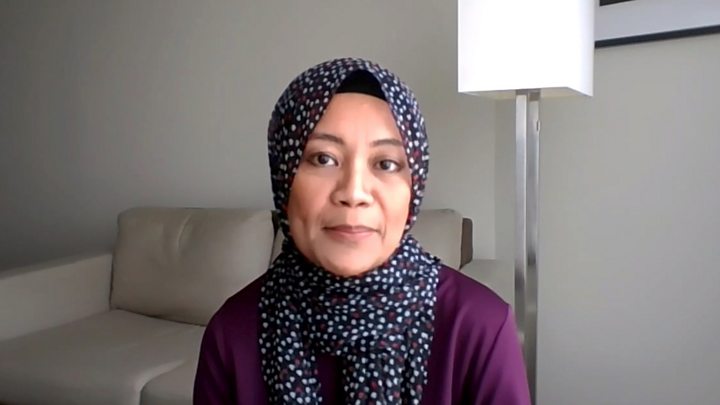The man who killed 51 people at two mosques in New Zealand in 2019 had plans to target a third mosque, his sentencing hearing has heard.
Brenton Tarrant also planned to burn down the mosques, wanting to "inflict as many fatalities as possible".
The Australian has pleaded guilty to 51 counts of murder, 40 attempted murders and one charge of terrorism.
Tarrant, 29, faces life in prison, possibly without parole - a sentence never before imposed in New Zealand.
The attacks, parts of which the gunman streamed live online, sent shockwaves around the world and prompted New Zealand to make swift changes to its gun laws.
Relatives attend hearing remotely
The hearing began on Monday morning in Christchurch, the city where the white supremacist carried out the attacks in March 2019.
Covid-19 restrictions mean the main court room is relatively empty.
An additional seven overflow courts within the law complex in Christchurch are being used for survivors and relatives of those killed - many of whom will give statements over the next three days.
Crown prosecutor Barnaby Hawes told the court that the gunman had began formulating a plan years earlier, and his goal was to "inflict as many fatalities as possible".
He gathered information about mosques in New Zealand - studying floor plans, locations and further details - with the aim of targeting them at the time they would be busiest.
In the months before the attack, he travelled to Christchurch and flew a drone over his primary target, the Al Noor mosque.
He also planned to target the Ashburton Mosque in addition to the Al Noor mosque and Linwood Islamic Centre.

Media playback is unsupported on your device
On the day of the attack, Tarrant shot people on the street as they tried to escape the Al Noor mosque, the court heard.
This included one victim, Ansi Alibava, whose body he drove over as he left the mosque.
As he drove towards the Linwood Islamic Centre, he stopped and shot at men of African origin who were able to escape. He briefly pointed his gun at a Caucasian man but then "smiled and then drove off".
Tarrant told police after his arrest that his plan was to burn down the mosques after his attack, and that he wished he had done so.
Tarrant had previously denied the charges and was due to face trial in June, before reversing his plea. He is representing himself in court.
He faces a minimum sentence of 17 years, but Justice Cameron Mander, the High Court judge presiding over the case, has the power to sentence him to a full life term with no parole - a sentence never before imposed in New Zealand.
More than 60 people will give in-person victim impact statements over the course of the next few days. Some have travelled from overseas and undergone a two-week coronavirus quarantine in order to take part.
Dr Hamimah Tuyan, whose husband Zekeriya Tuyan died nearly seven weeks after being shot at the Al-Noor mosque, flew from Singapore in time to undergo quarantine for the hearing.
She told the BBC she had wavered about whether to write an impact statement to be read in front of Tarrant, worried that it might "fan his narcissism", but decided ultimately that she would.
Hundreds of others will watch the proceedings on video feeds from other courtrooms in the city to allow for social distancing measures.
Less than a month after the shootings, New Zealand's parliament voted by 119 to 1 on reforms banning military-style semi-automatic weapons as well as parts that could be used to build prohibited firearms.
The government offered to compensate owners of newly-illegal weapons in a buy-back scheme.
"many" - Google News
August 24, 2020 at 08:06AM
https://ift.tt/34q8lWI
Christchurch shooting: Gunman Tarrant wanted to kill 'as many as possible' - BBC News
"many" - Google News
https://ift.tt/2OYUfnl
https://ift.tt/3f9EULr
No comments:
Post a Comment